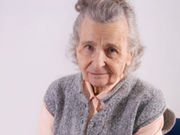
MONDAY, July 25, 2016 (HealthDay News) — About 25 percent of dementia patients in U.S. nursing homes are still quieted with risky antipsychotic medications. Now, a small study suggests that managing these difficult patients, instead of medicating them, could obtain better results.
“Drugs have a place, but should not be first-line treatments. They don’t work well, and there are side effects,” said study author Dr. Henry Brodaty, a professor of aging and mental health at the University of New South Wales in Sydney, Australia.
Antipsychotic drugs such as Risperdal (risperidone), Abilify (aripiprazole) and Seroquel (quetiapine) are approved to treat serious psychiatric conditions such as bipolar disorder and schizophrenia. But in seniors, they’re often used to calm aggressive or violent behavior linked to dementia.
“They’re basically a sedative,” said Dean Hartley, director of science initiatives with the U.S.-based Alzheimer’s Association. While he agreed that the drugs are warranted in some situations, he said dementia patients who take the powerful drugs are more susceptible to falls and have a higher risk of death.
The new study touts a program that trains nursing home staff members to focus on resolving specific issues bothering the patients and not to automatically sedate them.
It’s not clear how much this kind of program would cost in the United States or whether nursing homes could adapt to a new way of doing things. But it’s clear that the tranquilizers used on patients with dementia can be dangerous, said Hartley.
U.S. health officials have been trying to reduce the use of antipsychotics in long-term nursing homes. Since 2008, the U.S. Food and Drug Administration has required a boxed warning with all antipsychotic medications noting the increased risk of death in elderly patients with dementia-related psychosis.
The reported percentage of patients using the drugs dipped from 24 percent in late 2011 to 17 percent in 2015, according to background notes with the study.
Still, patients with dementia often need special management. According to Brodaty, 90 percent of people with dementia also experience agitation, depression, aggression, wandering, delusions and/or hallucinations.
His study included 156 patients at 24 nursing homes in Australia. All regularly took antipsychotic medications and were older than 60.
Nurses were trained how to handle difficult-to-manage behaviors without relying on drugs.
Of 135 patients taken off the antipsychotic drugs, 76 percent were still not using them 12 months later, the researchers said.
Hartley, the Alzheimer’s Association scientist, said focusing on the needs of patients requires understanding the issues that burden them. For example, he said, they may suffer pain from urinary tract infections but are unable to tell their caregivers.
Hartley mentioned the case of a patient who kept wanting to leave a facility, saying that it was raining outside. When asked, she explained that her kids — now grown — needed to be picked up at the bus stop. “They said they’d pick them up for her,” Hartley said, and the woman became calmer.
What about cost? This kind of program could actually reduce expenses, Hartley said, because patients would be less disruptive and need fewer emergency room visits due to injuries from falling.
Hartley cautioned that the study was small and needs to be validated. “It’s an important study, but it’s only the beginning,” he said. Still, the approach “may help caregivers or families know that their family members are being treated in a humane way.”
The study was scheduled for presentation Monday at the Alzheimer’s Association International Conference in Toronto. Medical studies released at conferences should be considered preliminary until published in a peer-reviewed journal.
More information
For more about dementia, visit the Alzheimer’s Association.






 May 19, 2018
May 19, 2018 



 December 13, 2016
December 13, 2016 
